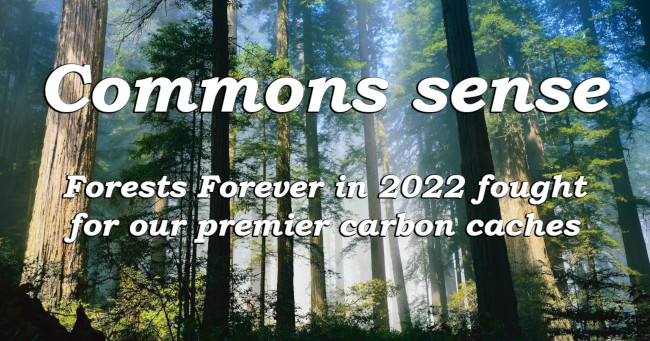| Donate |
What is the most important thing California's coast redwoods, giant sequoias, and oak woodlands have in common? Arguably, their role climate protection.
And from harboring unique plants and animals to purifying and storing water to mitigating wildfire to driving the economies of regions, California's diverse forest ecosystems offer a cornucopia of riches if only we'll let them be.
Forests Forever fought for a wide array of forest types and forest values in 2022.
In 2022 perhaps the single biggest victory in which Forests Forever played an important role was killing three potentially devastating logging plans at Jackson Demonstration State Forest on Mendocino's coast.
Covering more than two square miles (1479 acres) the Mitchell Creek, Boundary Creek, and Little North Fork plans were finally scrubbed by CalFIRE in May. Forests Forever was among the organizations that filed detailed science-based public comments to challenge the logging schemes.
The redwoods' California cousins get even bigger and older. Alarmingly, the giant sequoias once again came under threat this year. Forests Forever opposed the misleadingly named Save Our Sequoias (SOS) Act, sponsored by Rep. Kevin McCarthy (R-Bakersfield).
In the name of saving the sequoias from wildfire this bill would have weakened bedrock protections they currently enjoy under the National Environmental Policy Act, the Endangered Species Act, and other laws.
Although a new so-called Giant Sequoia Lands Coalition continues to press ahead with soil-damaging projects that are doing more harm than good, we were among the groups that made sure this wrong-headed federal bill to codify this coalition and these activities did not pass.
Still other California forest ecosystems boasting enormous carbon-trapping virtues hung in the balance. Napa County has become Ground Zero in the fight by local citizens to safeguard their over-stretched water supplies while checking rampant luxury winery and resort development.
We pressed the Napa County supervisors to take in hand the very tools they already possess to protect the oaks and watersheds with which their locality is so richly endowed.
Beyond those forests, many other stands of 80 years or more in age—and composed of many other species—are vital carbon sinks as well, yet are disappearing at an alarming rate.
Fortunately, President Joe Biden in April issued Executive Order 14072 calling for shielding of old-growth and mature trees from logging on public forestlands. But the policy doesn't go far enough, so we pushed for its strengthening and will continue this fight into early 2023.
By early 2022 there were promising signs that CalFIRE was feeling our coalition's pressure to change its management approach at Jackson Forest.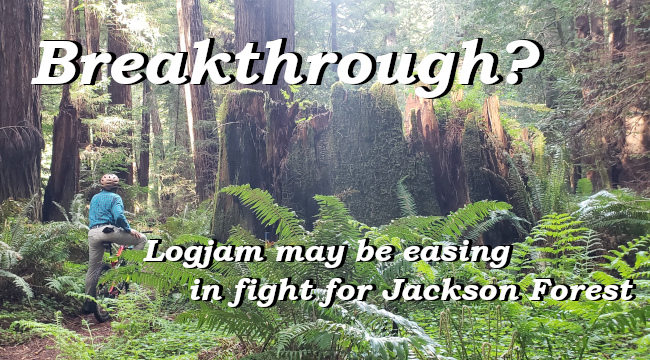
Several recent upbeat developments in the campaign to save Jackson had raised new hopes of a brighter future for the taxpayer-owned redwood forest.
The most recent development had taken place Mar. 2 when state Sen. Mike McGuire (D-North Coast) came out in favor of leaving stand the largest trees at Jackson and of supporting an early, and potentially substantial, overhaul of the forest's management plan.
"I'll just be honest. I'm a firm believer that we shouldn't be cutting these large trees in (Jackson) any longer," McGuire said at a town hall meeting. "I believe that the model... for (Jackson) is antiquated (and) in these modern times I'm not exactly sure what the forest is demonstrating...."
Jackson Demonstration State Forest, 49,000 acres and just 150 miles north of San Francisco, was purchased by the State of California in 1949. But in the decades since then Jackson's recovery has been slowed by industrial-style timber extraction sponsored by the self-same government agency—CalFIRE—that is tasked with enforcing California's forest-protective logging laws.
Forests Forever and its allies as of mid March had challenged two Timber Harvesting Plans (THPs) at Jackson—Little North Fork and Mitchell Creek. And apparently the prospect of litigation to halt the planned logging, as well as tree-sits, rallies and general outcry from area tribes and citizens, had prompted CalFIRE to hit Pause on its logging plans.
McGuire's broad-minded stance followed actions in recent months by the Mendocino County Supervisors, and a request to the state Board of Forestry by former CalFIRE Director Thom Porter, calling for revisiting Jackson's management plan with an eye to carbon sequestration and tribal co-management of the forest, among other issues.
Then on May 28, in the face of sustained and growing public outcry CalFIRE scrubbed three of its most controversial logging plans at Jackson Forest, including the two we had already challenged.
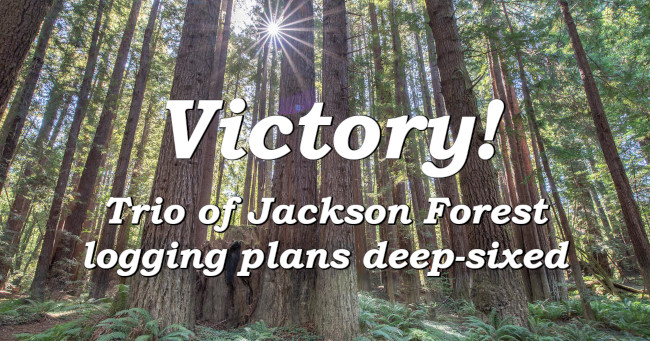 These THPs spanned 1479 acres—more than two square miles—of publicly owned redwoods on the Mendocino coast.
These THPs spanned 1479 acres—more than two square miles—of publicly owned redwoods on the Mendocino coast.
This victory was due to the many concerned citizens who wrote, called, and emailed public officials over many years. Not to mention the tireless tribal leaders and front-line activists who organized rallies and tree-sits and otherwise gave their time and energy to bring us this far.
The Mitchell Creek, Little North Fork, and Boundary Creek THPs had threatened to inundate salmon streams with tons of silt, destroy nesting sites for endangered species, and pump tons of carbon into the atmosphere.
Forests Forever had opposed industrial-style logging at Jackson as early as 2001. We were a co-plaintiff in a successful 2003 lawsuit that extended a stay of logging at Jackson until 2010.
While these three plans were gone there remained every reason to expect that CalFIRE (California Department of Forestry and Fire Protection) would attempt to resurrect some form of them in a future season.
For this reason Forests Forever and its allies are demanding a moratorium on logging at Jackson until a new management plan can be rewritten—one that will also satisfactorily address the State of California's expressed aim to co-manage Jackson with tribes such as the Coyote Valley Band of Pomo Indians.
The next shoe dropped on Aug. 24 when Jackson defenders learned that CalFIRE had resumed logging on several paused THPs at Jackson. This sent shock waves through the forest-defense community and left no doubt: The State of California must impose a moratorium on all such activities at Jackson immediately.
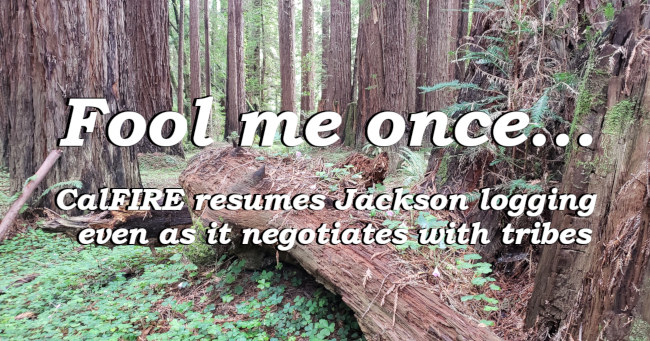 This resumption came at the very time when CalFIRE and tribal representatives were in the middle of government-to-government discussions, begun some six months earlier, concerning co-management of Jackson.
This resumption came at the very time when CalFIRE and tribal representatives were in the middle of government-to-government discussions, begun some six months earlier, concerning co-management of Jackson.
(These were not the THPs challenged in 2021 and 2022 by Forests Forever and other advocates: The Mitchell Creek, Little North Fork and Boundary Creek THPs had been shelved by CalFIRE in May. Re-starting logging on the four paused THPs–Red Tail, Soda Gulch, Chamberlain Confluence, and Caspar 500— shattered trust held by forest defenders that the agency was taking seriously their concerns while co-management discussions with the tribes were underway.)
"The State did not even bother to notify the tribe beforehand," said Michael Hunter, chairman of the Coyote Valley Band of Pomo Indians. "This makes me question the State's seriousness about co-managing ancestral lands."
Our trust in CalFIRE's good faith set back, we demanded a halt to all logging, as well as roadbuilding and herbicide use, at Jackson until the forest's new management plan was in place.
By the summer a new federal bill advertised as saving the world's most-massive trees from the effects of wildfire had reared its ugly head. This disingenuous measure actually would weaken conservation protections for these legendary trees and could set a precedent harming many other ecosystems as well.
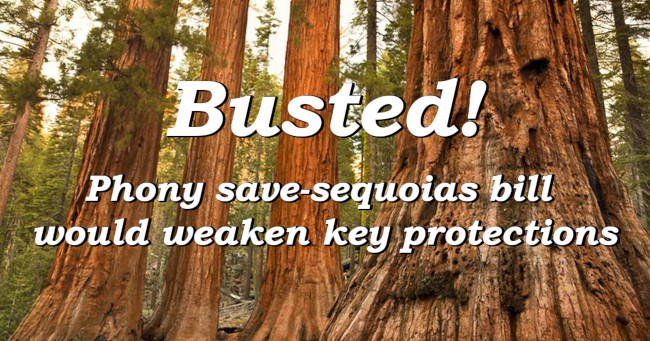 The perversely named Save Our Sequoias Act, H.R. 8168, authored by California Reps. Kevin McCarthy (R-Bakersfield) and Scott Peters (D-San Diego), would allow the waiver of key environmental laws in the name of an "emergency," potentially shutting out the public, environmental groups, scientists, and many other stakeholders.
The perversely named Save Our Sequoias Act, H.R. 8168, authored by California Reps. Kevin McCarthy (R-Bakersfield) and Scott Peters (D-San Diego), would allow the waiver of key environmental laws in the name of an "emergency," potentially shutting out the public, environmental groups, scientists, and many other stakeholders.
The measure would place key forest-management decisions into the hands of a new non-transparent body called the Giant Sequoia Lands Coalition.
A rash of California wildfires in recent years had killed many giant sequoias, which occur naturally only in California's Sierra Nevada range. But well-meaning concern over saving the sequoias does not justify suspending environmental laws such as the National Environmental Policy Act (NEPA), Endangered Species Act, and others.
Recently a coalition of some 80 conservation and environmental groups sent a letter to Congress urging it to stop this wrongheaded measure.
"This legislation would lead to rushed and poorly planned logging projects with major impacts on soil, streams, and wildlife that could result in increased wildfire risk and harm recreational opportunities and other uses," the groups wrote.
"Smart planning and public engagement as required by NEPA are integral to success, not a barrier to success."
Fortunately, at this writing the bill had not yet been voted out of committee and was reported as dead prior to the end of Congress' lame-duck session.
Our attention next turned to the Napa County Board of Supervisors, urging it to make good on its commitments to save the county's disappearing oak woodlands and conserve its dwindling water supplies.
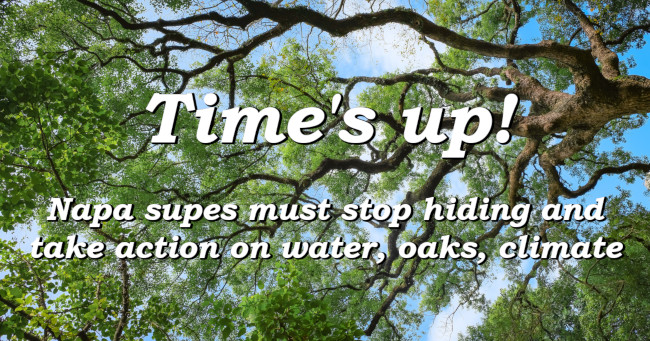 On July 12 the supervisors approved the controversial Walt Ranch project, a sprawling 316-acre vineyard estate development in the county's Atlas Peak area. Walt Ranch would destroy some 14,000 mature trees, mostly oaks, while placing even greater strain on the county's overtaxed water supplies.
On July 12 the supervisors approved the controversial Walt Ranch project, a sprawling 316-acre vineyard estate development in the county's Atlas Peak area. Walt Ranch would destroy some 14,000 mature trees, mostly oaks, while placing even greater strain on the county's overtaxed water supplies.
This short-sighted decision flew in the face of years of mounting citizen opposition to the project, as well as ignoring the implications of the county's own water data, which clearly indicate an unsustainable drawdown of its groundwater supply.
We urged our members to contact the supes, demanding that they use the tools they already had at their disposal to arrest the pell mell destruction of the county's oak woodlands and degradation of its watersheds.
World renowned as a wine-producing region, Napa County also has afforded a high quality of life to its populace. But in recent years residents have witnessed increasingly rapid changes— among them more-widespread wildfires as mountainsides have been continually stripped of the cooling shade and moisture of oak woodlands.
Meantime the supervisors had approved a lengthy succession of luxury wine/tourism developments that strained the county's finite water supplies, compounded traffic congestion and worsened impacts of the climate crisis while profiting from it.
Forests Forever is continuing to monitor this situation and is in close contact with activist allies in Napa County.
An unusual opportunity to help save America's increasingly rare and valuable old-growth forests emerged in 2022 when in April President Joe Biden signed Executive Order (EO) 14072 calling for a science-based strategy to save these unique and disappearing ecosystems across the country. But the decree is essentially an outline, lacking content necessary to maximize its scope and positive impact.
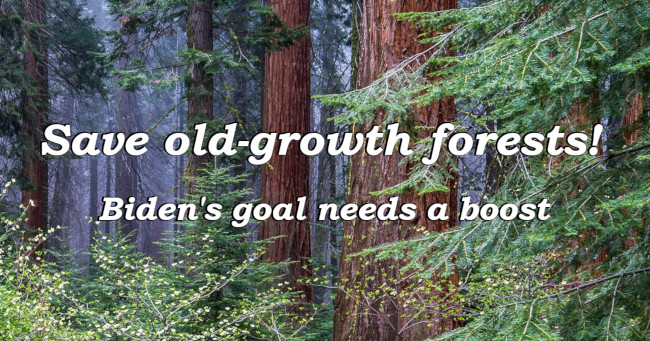 We mounted a call for letters to help maximize this opportunity, Biden's E.O., to save an essential biological resource for climate moderation, to prevent biodiversity loss, to increase water storage and purification, and much more.
We mounted a call for letters to help maximize this opportunity, Biden's E.O., to save an essential biological resource for climate moderation, to prevent biodiversity loss, to increase water storage and purification, and much more.
Forests Forever was among the Forest Carbon Coalition member groups that sent a letter to Biden Administration officials, calling on them to take additional steps to shore up the E.O.
It was a major step in the right direction but needs strengthening in the following areas: placing an actual moratorium on destroying or degrading these unique ecosystems (as we have long called for); expanding specific protections to less-mature forests that will grow into the old-growth of the future; and taking into scope all the threats to the forest biome, including but not limited to global warming, off-road vehicle use, fossil fuel extraction projects, grazing, and roadbuilding.
It is imperative that the new policies resulting from this E.O. make it clear that logging will not, as some interest groups argue, protect old-growth forests from wildfire.
An executive order is only as strong as it is shaped to become by the concerned citizens who support it. The fight to strengthen and implement Biden's old-growth forests E.O. will continue into 2023.
We also supported a state legislative bill in 2022 to direct California's mighty economy against tropical rainforest destruction.
 In late March I wrote, "The 2021 version of this measure passed both houses of the California legislature before it was vetoed. This time advocates are meeting with Gov. Gavin Newsom to develop language that will address his stated concerns.
In late March I wrote, "The 2021 version of this measure passed both houses of the California legislature before it was vetoed. This time advocates are meeting with Gov. Gavin Newsom to develop language that will address his stated concerns.
"Our members and supporters who wrote, emailed or donated in favor of the previous versions deserve a big thank-you!"
Authored by Assemblymember Ash Kalra (D-San Jose), A.B. 1979 was the California Deforestation-Free Procurement Act. It would have required that all state contracts involving "forest-risk commodities" (examples include palm oil, beef, rubber, and soy) certify that their operations do not contribute to tropical deforestation or abuses of indigenous peoples' rights. This would apply to contracts starting or renewing on or after Jan. 1, 2025.
The world's tropical forests are indispensable in the fights against both global warming and loss of biodiversity. These forests are some of the most carbon-rich biomes on the planet, harboring some 80 percent of all terrestrial species. Forest destruction is the second-largest driver of global CO2 emissions.
California's is the fifth largest economy in the world if it were a country, larger than the economies of the U.K and India. Our state government's purchasing power matters.
Although this measure did not pass we are in touch with allies in Sacramento and fully expect the procurement bill to be reintroduced. Its enactment will be an important step in making sure that Californians' tax dollars do not help destroy the lungs of the planet.

Paul Hughes
Executive Director
Forests Forever
| Your contribution today will help California's forests thrive! | |
|
